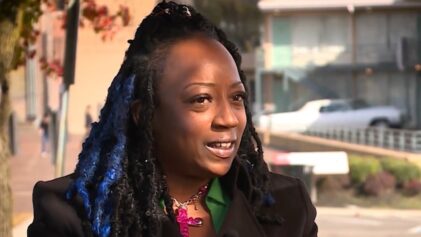Black Lives Matter activist Pamela Moses has been cleared of voter fraud charges and will not have to stand trial again in a case that was brimmed with injustices against the Tennessee woman.
Moses, who has previous felony convictions, tried to register to vote in 2019 after receiving confirmation from the state that her rights could be restored. Except, Moses had permanently lost her voting rights under Tennessee law. She was convicted of voter fraud and probation violation and sentenced to six years and one day in prison in January.

New evidence in the case showed a probation official erroneously gave Moses clearance to register to vote. She was released in February and was awaiting a new trial.
Shelby County District Attorney Amy Weirich dismissed the charges on Friday “in the interest of judicial economy.”
Weirich said, in a statement, the Memphis woman spent 82 days in custody for the allegation, “which is sufficient,” but the prosecutor does not address the state’s missteps. Many condemned Weirich’s statement online.
“That’s a disgusting statement from the DA. [Moses] did nothing wrong,” Twitter user, @JBoy02 said. “They know she did nothing wrong. She never should have been charged. She never should have spent a single second in prison much less 75 days or 6 damn years.”
Tennessee Criminal Court Judge Mark Ward accused Moses of tricking the probation office into certifying her rights restoration documents. An investigative report later revealed that probation officials made an error that misled Moses into believing she could vote.
An internal email published by The Guardian showed a Tennessee Department of Corrections probation officer did not thoroughly check Moses’ file and stamped a document validating the end of her probation.
Moses took the document to the election office to complete her voting registration. It was flagged by probation officials the next day. Ward said the email was withheld during the trial even though the probation officer took the stand.
Department of Corrections internal investigators found that the employee identified as Manager Billington did not do his “due diligence” in September 2019 when he overlooked an order that kept Moses on probation until Aug. 13, 2020.
Moses started checking her probation status when her candidacy for Memphis mayor was rejected by election officials in summer 2019 because of her prior conviction.
The activist was convicted for evidence tampering in 2015, an offense that permanently strips her of a right to vote in Tennessee. Moses’ name was still on the voter rolls. Election officials never mentioned the preceding law.
Instead, Moses was advised to get her rights restored, she said.
Moses first sought confirmation from a judge, who told her she was still on probation. She then went to the probation office to double-check.
“The case should not have been prosecuted right from the beginning because there was no trickery,” Moses’ lawyer Bebe Anyanwu said.
Voting advocates and other supporters said Moses’ case exemplifies the deep racial disparity in sentencing. White Americans with more straightforward allegations of voting fraud have been sentenced to less time than Moses or have not received any jail time at all.
“What we see consistently is honest mistakes made by returning citizens are penalized to the max, and true bad intentions are not being penalized to the same extent,” Sylvia Albert, director of voting and elections for Common Cause, said. “And usually in those cases, the defendants are white.”
The district attorney’s announcement came the same day the South Carolina Elections Commission revealed that former President Donald Trump ex-chief of staff, Mark Meadows, was registered to vote in North Carolina, Virginia and South Carolina at the same time.
The New Yorker reported in March that Meadows was registered to vote in North Carolina under a 14-by-62-foot mobile home where he didn’t live, despite voting with the address on his voting records in 2020. He also voted in the gubernatorial election in Virginia in 2021 and registered to vote in South Carolina months later.
“Mark Meadows was simultaneously registered to vote in three states. Pamela Moses was sentenced to 6 years for registering to vote in one,” Twitter user Flex Ghost wrote. “Tell me again who justice is blind to?”
The Tennessee NAACP has sued Gov. Bill Lee, state corrections and election officials for failing to establish clearer procedures for Tennesseans with felony convictions to get their rights restored, “leading to a rights restoration process that is unequal, inaccessible, opaque and inaccurate.”
A 2017 study found that more than 8 percent of applications for a voting rights restoration submitted in Tennessee were rejected because the voters were still ineligible. The denial rate was higher among Black men at more than 22 percent.
The NAACP lawsuit alleges that less than 5 percent of the “tens of thousands” of disenfranchised voters who are eligible to get their rights restored in the state have not been able to obtain an application.
Just 1 percent of the at least 365,356 people that have completed their sentence, including probation and parole, had their applications approved since 2016, the lawsuit filed in December 2020 alleges. About 175,000 otherwise eligible Black voters cannot vote in Tennessee because of a felony conviction, according to criminal justice nonprofit organization Sentencing Project.


